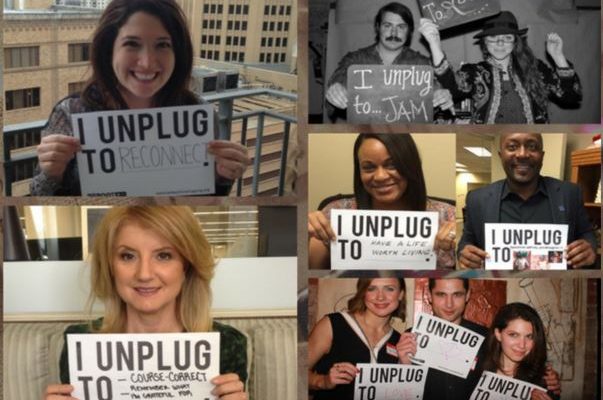NEW YORK, Feb. 7, 2018 – Toxic, addictive, isolating and distracting. Exhilarating, connective, transformative, productive. These are only some of the inflammatory words connected to smartphone usage. As a growing number of the tech leaders who designed the device’s compulsive features step forward to speak out against tech manipulation, the National Day of Unplugging by the global nonprofit Reboot, March 9 – 10, offers a 24-hour respite from the never-ending torrent of text messages, push notifications and smartphone games hijacking our time and attention.
From sundown on Friday, March 9, through sundown Saturday, March 10, the National Day of Unplugging, created by the global nonprofit Reboot, will demonstrate the positive impact a 24-hour digital power-down can have on individuals, families and entire communities, giving people a collective break and a reset on their technology use. From “fake news” to real news, people in every corner of our increasingly global world are struggling to keep up with push notifications and the bottomless information scroll. The National Day of Unplugging is the day for people to challenge themselves to disconnect from these tech platforms and reclaim control of their lives. People who take a pledge to put away their devices during the National Day of Unplugging can receive a free cell phone “sleeping bag” from Reboot.
We now take digital devices with us everywhere, immune to the ways they distract – in the aggregate, more than nine billion times per day. Eighty-seven percent of people wake up and go to sleep with their smartphones, tech experts say, and according to a 2016 study, on average people swiped, tapped or clicked their phones 2,617 times each day. Adults between 18 and 24 sent and received an average of 128 texts a day in 2016. The trends show these numbers rising every year at an alarming rate. The National Day Unplugging encourages everyone to stop and unplug to take stock of themselves, their lives and their surroundings.
Tristan Harris, National Day of Unplugging advocate and founder of the Center for Humane Technology, champions the mounting concerns that technology is having on society.
“Our society is being hijacked by technology. What began as a race to monetize our attention is now eroding the pillars of our society: mental health, democracy, social relationships, and our children. A day like the National Day of Unplugging should be a national imperative to have these conversations on a large scale,” Harris said. “In the future, we will look back at today as a turning point towards protecting our minds and replenishing society.”
People are encouraged to take Reboot’s National Day of Unplugging Pledge to amplify their decision to take a tech break. Check out the National Day of Unplugging Tool Kit at www.NationalDayOfUnplugging.com, to get a cell phone sleeping bag, an “I UNPLUG TO ___________” poster to post to social channels, and discover everything from conversation kits to activity guides to make the most out of this screen-free, re-humanizing day. Sign up alone, galvanize your family, friends, school or workplace or join the hundreds of organizations that will engage their communities in this year’s global event to reclaim time. Unplug with others by attending one of the more than 500 live unplugging events at music festivals, parks, and clubs around the world.
“Technology is both one of the most helpful and potentially troubling modern-day advances – making communication easier as a global community, but also feeding addictive behaviors that often supersede human interaction,” said David Katznelson, Reboot’s executive director. “The National Day of Unplugging is designed to remind us that we need to lift our bowed heads from the screens once in a while and make time for the world in front of us – not just the one unfolding on our phones. At a time fraught with controversy around every corner, we invite people everywhere to unplug with us on March ninth and 10th and reconnect with what gives their lives meaning.”
Worldwide in 206 countries (including far-flung places such as the Bhutan, the Isle of Man, the Aaland Islands, Mongolia, Andorra, and Kazakhstan), more than 112,000 people have been engaged directly in 1,000 unplugging events just in the past five years.

